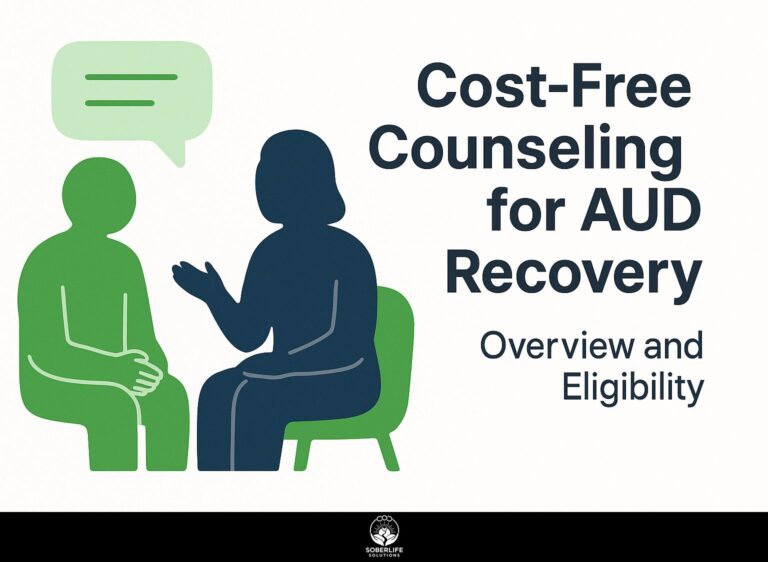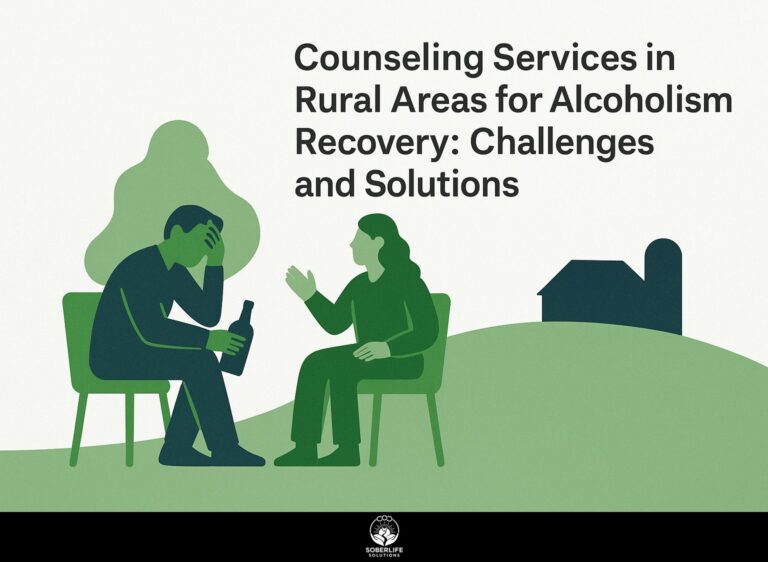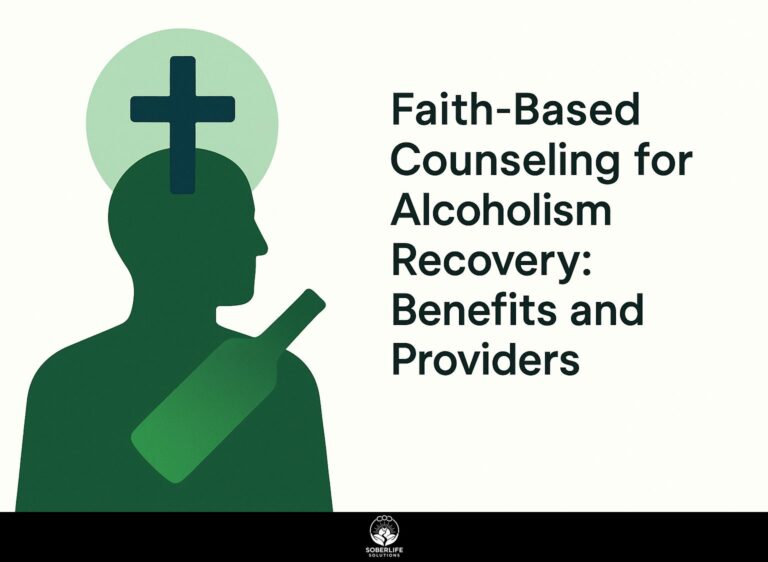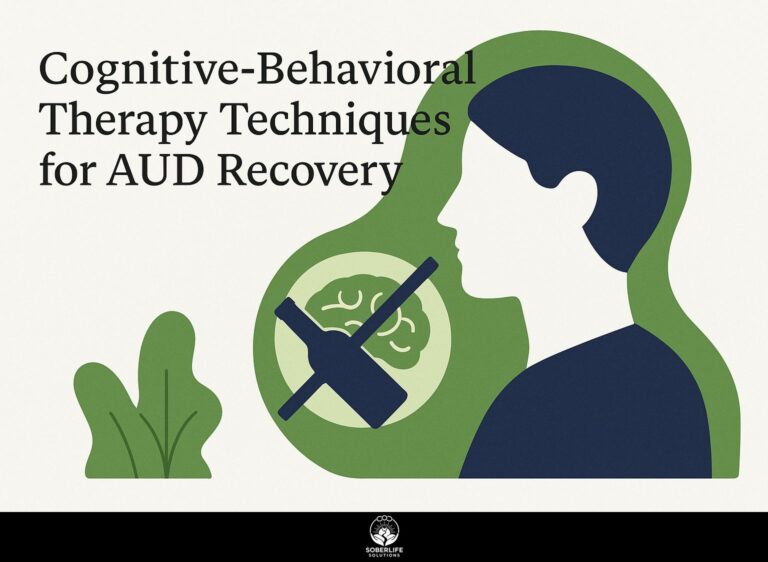Benefits of Alcohol Counseling: Tools for Long-Term Sobriety
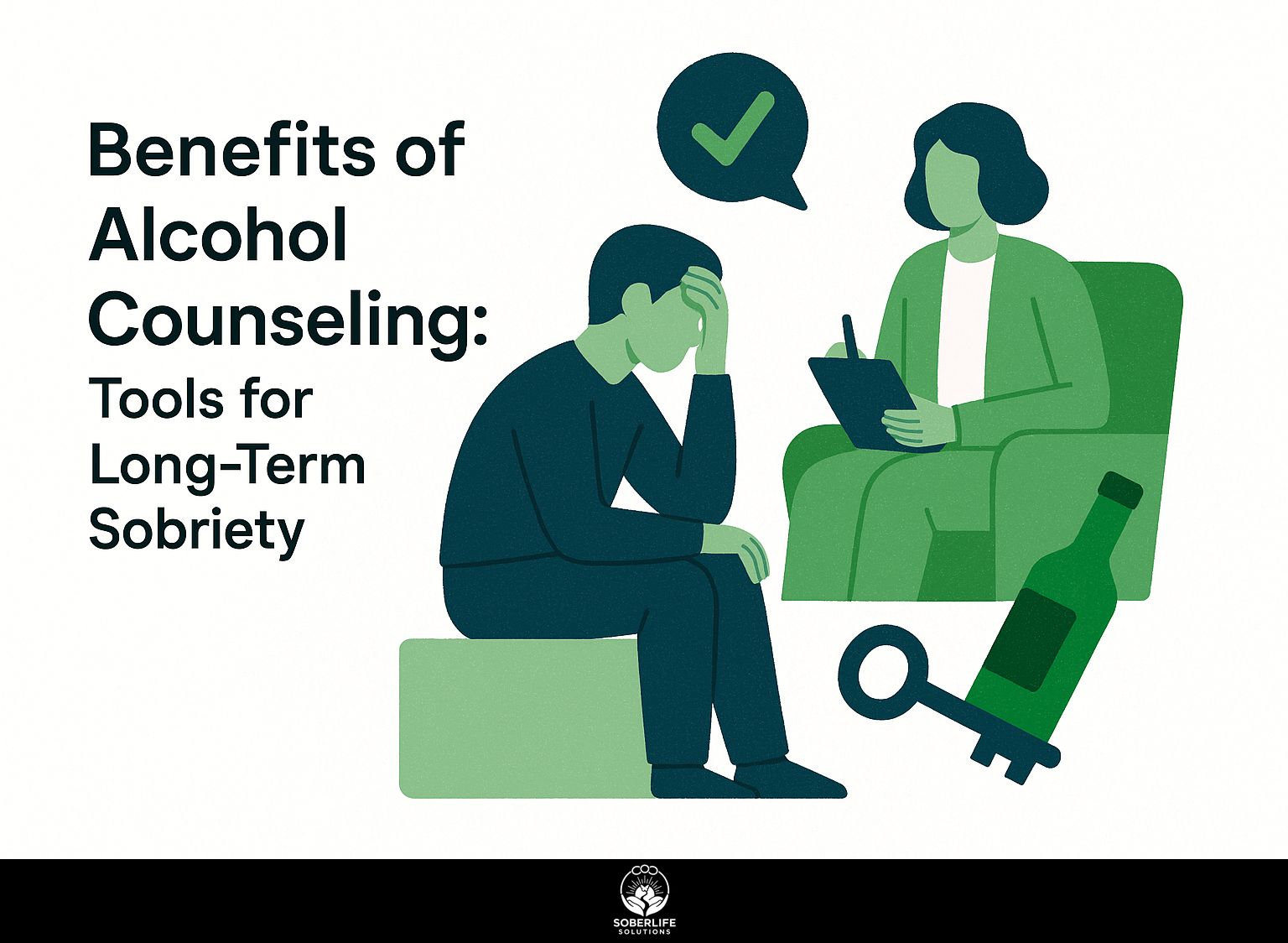
Struggling with alcohol use disorder? Alcohol counseling provides important help for staying sober by using effective treatment methods. Counseling helps people deal with substance use problems by improving their coping skills and encourages them to join support groups with others. This article discusses the many benefits of alcohol counseling, helping you learn how ongoing support can lead to a healthier life without substances and with a caring community.
Key Takeaways:
Understanding Alcohol Use Disorder
Alcohol use disorder is marked by an uncontrollable habit of drinking that can greatly affect a person’s life, needing specific treatment methods.
According to the DSM-5, diagnosis requires at least two of 11 criteria, such as unsuccessful efforts to cut down and continued use despite negative consequences. In the U.S., approximately 14.1 million adults experience this disorder. For a comprehensive understanding, the transition from DSM-IV to DSM-5 as detailed by ScienceDirect offers valuable insights into the diagnostic evolution.
Successful treatment often involves customized approaches, like cognitive-behavioral therapy (CBT) to address thought patterns associated with drinking, and motivational interviewing to strengthen belief in one’s capacity to change. Mindfulness techniques, which help individuals remain present and aware, can also play a crucial role in recovery strategies by fostering an environment of self-reflection and focus. Learn more about integrating mindfulness into alcoholism recovery to enhance these therapeutic practices.
Support groups like Alcoholics Anonymous can be very important in recovery, helping people stay responsible and providing community support.
Importance of Professional Help
Getting professional help is important for successful recovery because studies show that people who go to counseling are 50% more likely to stay sober over time.
Professional support can take many forms, including one-on-one therapy, group counseling, and support groups like Alcoholics Anonymous (AA).
For instance, cognitive-behavioral therapy (CBT) has been shown to reduce relapse rates effectively by addressing negative thought patterns. As explained by Verywell Mind, CBT is a valuable tool in treating addiction, as it equips individuals with strategies to manage cravings and prevent relapse.
Websites like BetterHelp or Talkspace link people with licensed therapists, allowing them to easily get help without leaving their home. The blend of formal therapy and help from peers offers a well-rounded method, leading to a greater likelihood of long-lasting recovery.
Benefits of Alcohol Counseling
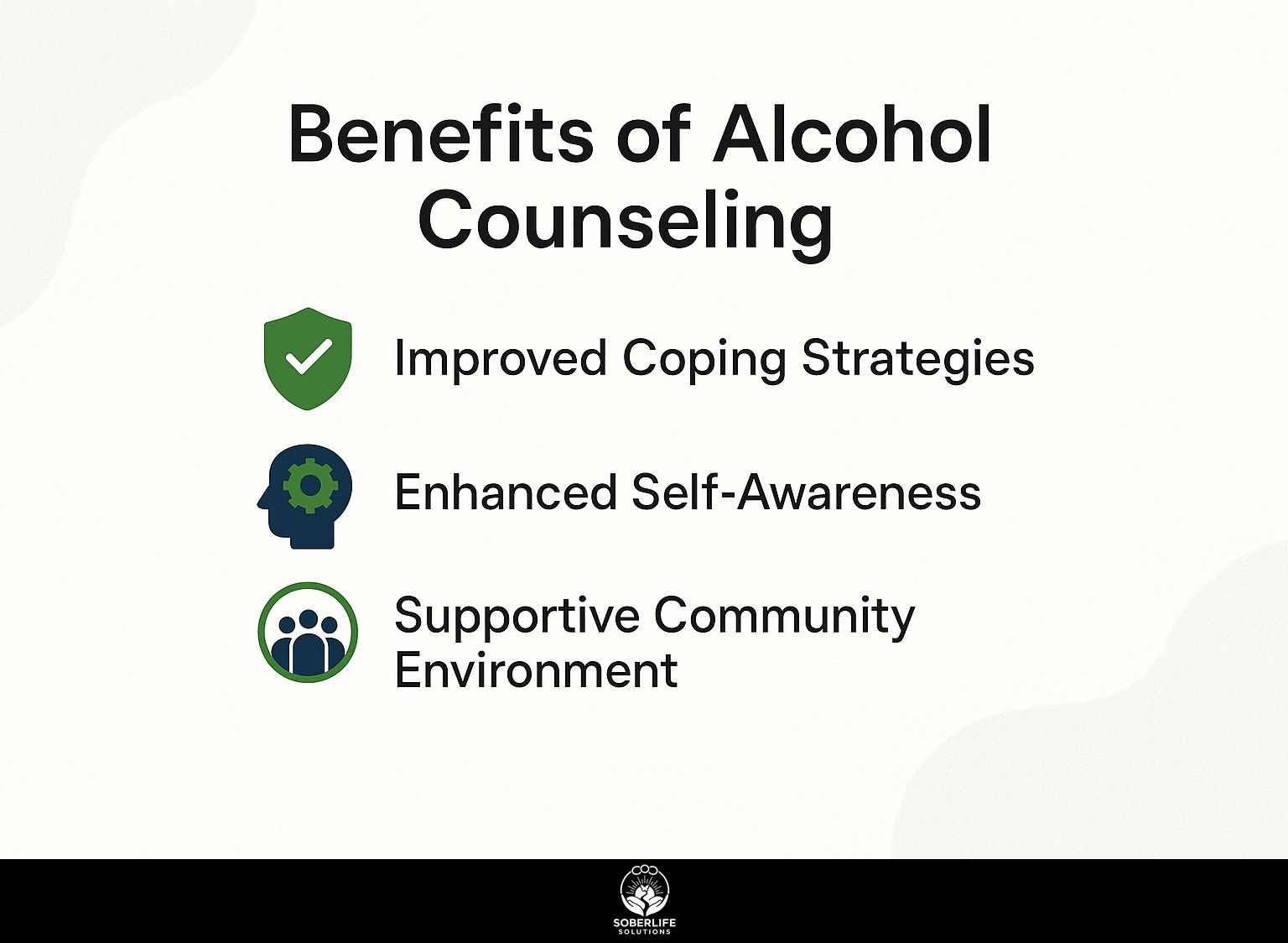
Alcohol counseling offers many benefits, helping people learn coping skills and increasing their self-awareness. For more insights into how self-awareness can aid in addiction recovery, explore our detailed guide on developing self-awareness in addiction recovery.
Improved Coping Strategies
Counseling provides people with practical ways to handle stress that can lower the chance of relapse by 40%, helping them deal with challenging situations.
Among the most effective techniques are mindfulness-based approaches, such as meditation and deep-breathing exercises. Studies indicate that people who regularly practice mindfulness say they have fewer cravings and better control over their emotions.
For instance, a study in the Journal of Substance Abuse Treatment indicated that participants using mindfulness reported a significant reduction in relapse rates. This aligns with findings from JAMA Network, which suggests that mindfulness training can be more beneficial than standard recovery support for individuals dealing with opioid use.
Cognitive-behavioral strategies like thought-stopping can help individuals challenge negative thoughts associated with substance use. Engaging in regular group therapy sessions further reinforces these strategies, providing peer support and accountability. To enhance these methods, it’s crucial to understand and incorporate [emotional regulation techniques for sobriety](https://soberlifesolutions.com/emotional-regulation-sobriety/), which can significantly aid in maintaining stability during recovery.
Enhanced Self-Awareness
Engaging in counseling increases self-awareness, allowing individuals to recognize triggers and understand their relationship with alcohol more clearly.
One effective tool for enhancing self-reflection is motivational interviewing (MI). MI allows for an open talk where patients feel comfortable discussing their thoughts on drinking alcohol.
For example, counselors might ask open-ended questions, such as `What do you like about drinking?’ or `How has drinking impacted your life?’ This method promotes greater self-awareness, which research shows can lead to improved treatment outcomes.
Using MI techniques can greatly improve a counselor’s ability to help clients work through their issues.
Supportive Community Environment
Counseling helps create a helpful community setting, which greatly affects recovery rates. People are 70% more likely to stay sober when they take part in peer support groups.
Groups like Alcoholics Anonymous (AA) are very important in this process. They provide a structured format for individuals to share experiences and hold each other accountable.
For instance, stories of members who initially struggled but eventually flourished often highlight finding strength in vulnerability. Programs with 12 steps and regular group meetings provide important help and make people feel connected.
Sarah’s story is a success. She attended weekly meetings, stopped drinking, and improved her relationships and career. This shows how peer support can greatly help.
Types of Alcohol Counseling
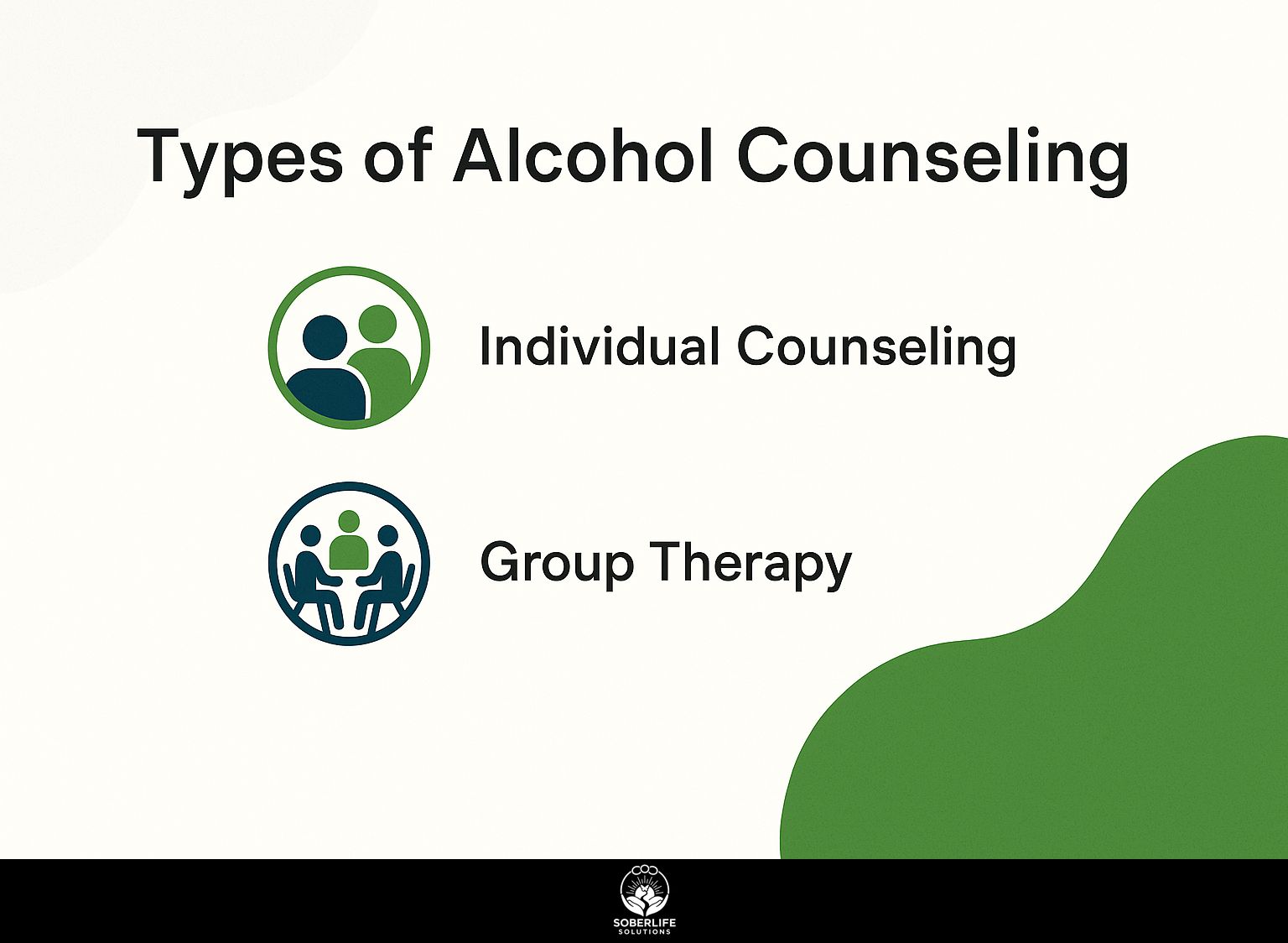
Alcohol counseling includes different kinds of therapy methods, each created to suit the specific needs of people dealing with alcohol addiction. This approach aligns with the principles outlined in our analysis of Alcohol Counseling Techniques: Types and How They Work.
Individual Counseling
Personal counseling provides customized help that can significantly increase confidence and commitment to recovery.
In one-on-one sessions, therapists tailor their approach based on the specific needs and experiences of the individual. This individual attention creates a secure space where clients feel at ease talking about personal topics, like substance use.
For example, a therapist might use motivational interviewing techniques to help clients articulate their goals, while cognitive-behavioral strategies can address underlying thought patterns contributing to addiction.
Over time, establishing trust allows for deeper exploration of personal triggers and coping mechanisms, facilitating a more meaningful path to recovery.
Group Therapy
Group therapy allows people to talk about their experiences and help one another, making it a useful part of alcohol counseling. It has a 60% success rate in helping people stay sober.
In group therapy, participants engage in facilitated discussions that encourage them to share personal experiences and strategies for coping with addiction.
Formats like the 12-step program offer a clear method, where members help each other by sharing their experiences and challenges.
Using methods like role-playing and mindfulness exercises can improve emotional expression and build resilience. Research indicates that individuals in group settings often feel less isolated, which can lead to improved emotional health and an increased likelihood of sustained sobriety.
Engaging with others helps reinforce commitment to recovery goals.
Tools for Long-Term Sobriety
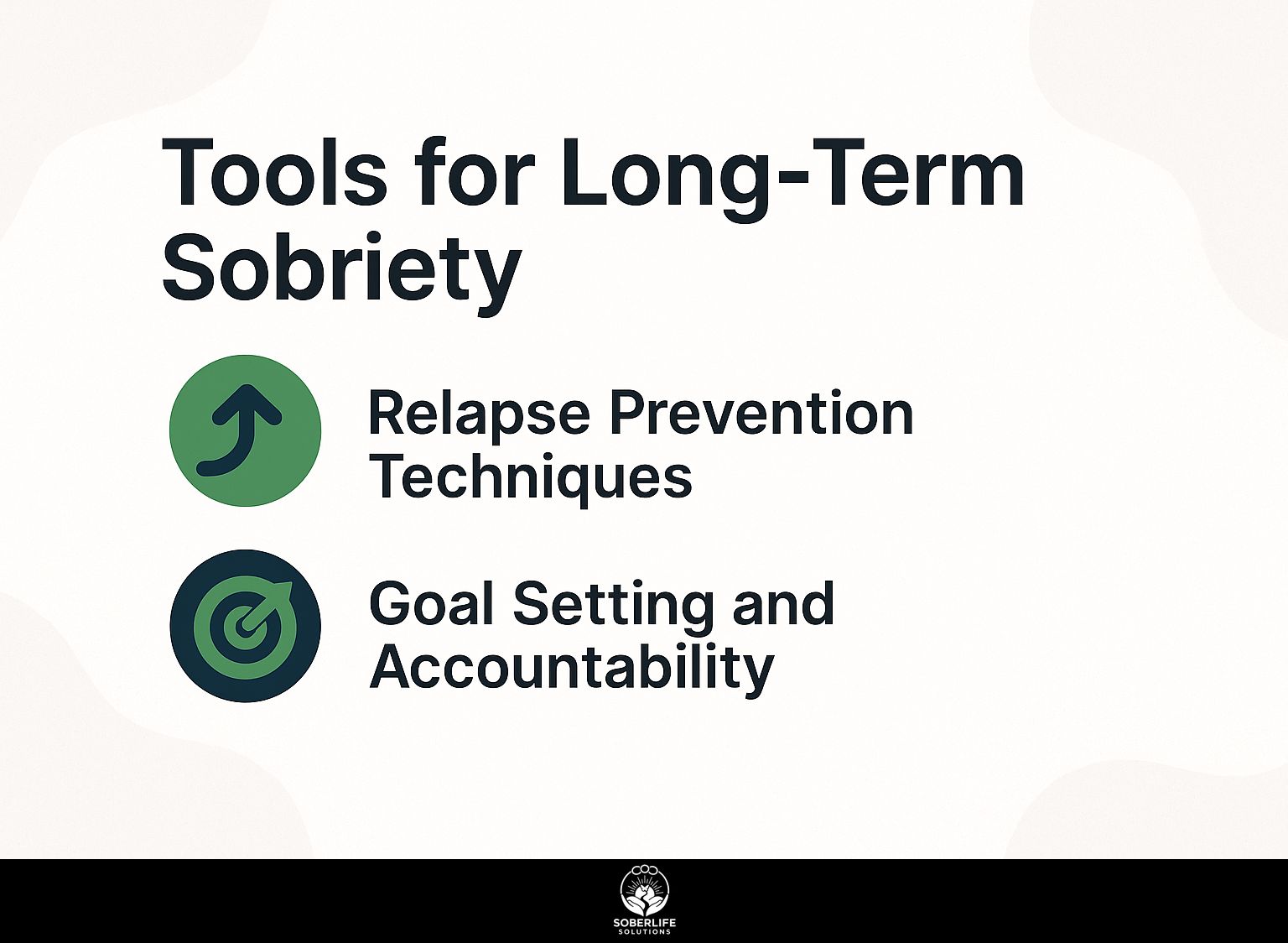
Useful resources for maintaining sobriety are important for those recovering from alcohol addiction, offering organization and responsibility. Worth exploring: Recovery Resources & Support Articles that provide guidance and support for a successful recovery journey.
Relapse Prevention Techniques
Implementing relapse prevention techniques can reduce relapse rates by over 30%, employing behavioral strategies such as mindfulness-based relapse prevention.
One effective method is adding daily mindfulness practices, like meditation or journaling, which can improve self-awareness and help manage emotions. Tools like Headspace offer guided meditations specifically aimed at addiction recovery.
Develop an action plan that includes identifying personal triggers and creating coping strategies. For instance, if social situations lead to cravings, plan alternative activities like exercising or engaging in a hobby.
Regularly attending support group meetings, either in-person or via platforms like Zoom, can also reinforce your commitment to sobriety and connect you with others facing similar challenges.
Goal Setting and Accountability
Setting clear goals and accountability can improve treatment results, as participants experience 40% better success rates when they follow a structured plan.
To set clear goals, begin by stating what you want to achieve, such as “I want to lower my anxiety symptoms by 30% in three months.” Keep track of how you’re doing with a recovery journal, where you write down your daily thoughts and any difficulties you face.
Apps like Daylio or Journey can help you monitor your mood and daily habits.
Holding meetings every week or two keeps you accountable and allows you to adjust your plans if needed. By keeping these structures and tools, you build a helpful setting that encourages improvement and ongoing recovery.
Frequently Asked Questions
What are the benefits of alcohol counseling?
Alcohol counseling can provide a variety of benefits including increased self-awareness, improved coping skills, and support in maintaining long-term sobriety.
How can alcohol counseling help with long-term sobriety?
Alcohol counseling provides tools and strategies to help individuals maintain their sobriety over a longer period of time. It can also offer ongoing support and guidance to address challenges and triggers that may arise.
What types of tools are used in alcohol counseling for long-term sobriety?
Some common tools used in alcohol counseling include cognitive-behavioral therapy, support groups, and relapse prevention techniques. These tools are customized to fit the unique needs of each person and can support lasting sobriety.
Is alcohol counseling only for those in recovery?
No, alcohol counseling can be beneficial for anyone looking to develop a healthier relationship with alcohol. It can also be helpful for loved ones of those struggling with alcohol use disorders.
How often should someone attend alcohol counseling for long-term sobriety?
The frequency of alcohol counseling sessions can vary depending on individual needs. Some may benefit from weekly sessions while others may only need monthly check-ins. It is important to work with a counselor to determine the best schedule for maintaining long-term sobriety.
Can alcohol counseling be done online?
Yes, many alcohol counseling programs offer online options for those who may not have access to in-person sessions or prefer the convenience of virtual counseling. Online counseling can also be a helpful resource for individuals in rural areas or for those with busy schedules.


